May 26, 2016 Ryukyu Shimpo
By Ryota Nakamura
On the evening of May 25, Prime Minister Shinzo Abe met with United States President Obama in Shima of Mie Prefecture and held a joint press conference. Regarding the recent incident of a woman’s body being disposed of by a U.S. military employee, Obama expressed his sorrow for the victim; however, he did not apologize. Although Obama stated that he would do all he can to prevent a recurrence of such an incident, there were no specific measures given. Regarding the revision of the Japan-U.S. Status of Forces Agreement (SOFA), Obama said that it does not prevent the pursuit of justice under Japan’s judicial system, and showed no interest in revising. Abe said, “As for the SOFA, we will improve problems one by one and pile up the results.” He did not ask the president for the revision of the SOFA. Abe did not mention Okinawa governor Onaga’s request to meet Obama.
At the meeting, Abe mentioned the incident in “absolute protest” and requested the United States take action for effective prevention of a recurrence.
Obama stated that he would express his condolence and sorrow. He also said that he was surprised by the very violent crime by a U.S. military-related person. Obama said that he was shocked, and that the crime was inexcusable.
Regarding the suspect, Obama said the U.S. government would work together with Japan on the investigation and said the suspect should be judged under the Japanese judicial system.
Obama stressed there was no need for a revision of the SOFA as the suspect had the appropriate legal liability under the current agreement.
There was no mention of the removal or reduction of the military bases in Okinawa.
About the growing reaction against the military bases in Okinawa, Abe said, “It is difficult to recover the lost trust, but we, Japan and the United States, agreed to do our best to reduce the burden on Okinawa of hosting military bases.”
The meeting was initially planned for the morning of May 26 when the G7 Ise-Shima Summit opens. However, it was rescheduled to take place immediately after Obama’s arrival in Japan in order to appear to be responding quickly at the top level to the growing anti-military sentiments in Okinawa,
(English translation by T&CT and Megumi Chibana)
Go to Japanese
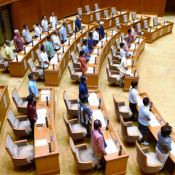
May 27, 2016 Ryukyu Shimpo
At an extraordinary session of the Okinawa Prefectural Assembly opened on May 26, both the ruling party in the Assembly and those belonging to other parties unanimously agreed on a resolution of protest and a written argument against the recent incident of a woman’s body being dumped by a military base employee. The resolution and argument demand an apology and full reparations to the bereaved family of the woman, abandonment of the plan to build a relocation facility for Futenma Air Station in Henoko, and withdrawal of the U.S. Marine Corps from Okinawa. This is the first time the Prefectural Assembly has made a resolution demanding the withdrawal of the Marine Corps. LDP members as well as Hikaru Minei (independent) and Hiroshi Goya (independent) did not participate in the vote on the resolution and argument.
Part of the written argument states that the base employee’s brutal act makes light of Okinawan citizens’ lives, and such acts absolutely cannot be permitted. The argument also calls for (1) an apology and full reparations to the bereaved family, (2) negotiations with Japanese and American heads of state concerning countermeasures to military base issues, accidents and incidents, (3) abandonment of relocation of Futenma Air Station within Okinawa, (4) withdrawal of the U.S. Marines from Okinawa and substantial reduction of bases, (5) drastic revision of the U.S.-Japan Status of Forces Agreement, (6) and a temporary suspension be enforced on access to civilian areas by training drills, military personnel, and military vehicles when a violent incident occurs.
The written argument is addressed to Japan’s prime minister, foreign minister, minister of defense, and minister in charge of Okinawan affairs. It is also addressed to the U.S. ambassador to Japan, the commander of the U.S. Forces Japan, the Okinawa area coordinator, and the U.S. consul general in Okinawa.
Minei and the LDP members who left their seats at the vote had requested some changes to the wording of the written argument. They had asked for “abandonment of relocation of Futenma Air Station” to be changed to “the closure and return of Futenma Air Station,” and “withdrawal of the U.S. Marines from Okinawa,” to “aiming for substantial reduction and speedy adjustment and reduction of U.S. bases.” These members submitted a revised version of the proposal containing the aforementioned changes. The revision also demanded an end to incidents, an apology to the bereaved family, and compensation from the Japanese and U.S. governments. However, only a minority voted for the revised version, and it was rejected.
Members of Komeito voted in favor of both versions of the written argument.
Before making the resolution, all members assembled at the session offered a moment of silence for the victim of this recent incident.
(English translation by T&CT and Erin Jones)
Go to Japanese
May 27, 2016 Ryukyu Shimpo
Partial responsibility for the recent murder of an Okinawan woman by a former U.S. Marine and current U.S. military employee belongs to U.S. President Barack Obama, as the commander in chief of the U.S. armed forces, and Japanese Prime Minister Shinzo Abe, who provides the United States with bases in Japan. Awareness of that responsibility is decisively lacking in both heads of state.
Why did Obama and Abe discuss the recent murder case during their summit meeting at all? They should both seriously reflect on the fact that their discussion ultimately disappointed the people of Okinawa.
Obama expressed his condolences and feelings of regret, but did not apologize. It is problematic if he believes that he is not in the position to apologize.
U.S. Secretary of State John Kerry expressed to Japanese Foreign Minister Fumio Kishida a sincere apology to the family and friends of the victim. But is this really a problem that can be dealt with by an apology over the phone by the Secretary of State? It even seems that the government may not consider the incident grave enough to warrant an apology from the president himself.
There have been no successful measures to prevent recurring incidents, either. Obama said that he will do everything he is able to do in order to prevent a recurrence. However, what he is able to do depends on arbitrary decisions by the U.S. government. Based on past experience, we do not have high hopes for what the U.S. government is “able to” do.
Past measures discussed and implemented have included enforcing strict discipline, conducting thorough education of U.S. military personnel and employees, and restricting off-base excursions and alcohol consumption off base. All those measures only led to the present incident. If the U.S. does not show that it is “able to” do anything more than it has done in the past, one could take that as an indication that it lacks the will to seriously endeavor to prevent a recurrence.
What the people of Okinawa demand is not more of the same ineffective prevention measures that the Japanese and U.S. governments have put forth in the past. We demand measures that will eradicate all heinous crime and ensure that not one more person will become a victim. Prime Minister Abe lacks that perspective, as was evident from his request to Obama merely for measures to prevent a recurrence.
When it comes to the lives and safety of the people of the prefecture, what matters is results. If the governments’ efforts are not made with the readiness to promise the withdrawal of U.S. forces and closure of the U.S. bases in Okinawa in the event of a future heinous crime, then such crimes will likely continue to occur.
The U.S.-Japan Status of Forces Agreement is one reason for the persistence of incidents. It is necessary to eliminate the sense of privilege among U.S. military personnel and employees that comes from the belief that they will be protected even if they commit a crime. However, both heads of state rebuked this demand from the Okinawan people, promising merely to “improve the implementation” of the Status of Forces Agreement.
Without a fundamental revision of the Status of Forces Agreement, it is impossible to believe that the governments have the will to eradicate heinous crime. There is no way to protect the people of the prefecture but to close all of the U.S. bases in Okinawa. The summit meeting between Obama and Abe proved as much.
(English translation by T&CT and Sandi Aritza)
Go to Japanese
May 19, 2016 Ryukyu Shimpo
Okinawa Governor Takeshi Onaga, who is currently visiting the U.S. held a meeting with Chairman of the Senate Committee on Appropriations Thad Cochran on May 17. Onaga requested that the U.S. government listen directly to Okinawan residents in order to resolve the issue of relocating the US Futenma airbase.
Cochran asked Onaga whether there were any envoys who could listen to the governor or Okinawan residents and discuss possible solutions. Onaga told him, “both the US and Japanese governments only repeat that Henoko is the only option.” He further stressed, “I would be grateful if the US made an effort to listen to Okinawan residents.”
Onaga met with a total of eight members including seven assembly members from both the upper and lower houses as well as one aide including Senate committee chairperson Cochran. This meeting ended Onaga’s lobbying activities in Washington.
Also on his trip, Onaga was asked by a member of the United States House Committee on Armed Services, Scott Rigell, where Futenma airbase should be relocated and whether it would be more acceptable if the facility were smaller.
Senate member Shelley Moore Capito said it was helpful to learn from the governor and gain understanding about Okinawa through discussing the dilemma of the military base. A congressman in the House Armed Services Subcommittee on Readiness who visited Okinawa in February, Robert Wittman, remarked that he would be closely watching how Okinawa Prefecture and the Japanese government handle the Henoko issue.
After the meeting, Onaga spoke to the media, reflecting on his exchange with US politicians.
“The majority of members saw Henoko as the only option last year, but this year, no one said that directly. I think an understanding has been established.” The Governor attributed the increased level of understanding to the suspension of construction due to an out-of-court settlement on the lawsuits between the prefecture and national government, remarking that the settlement had had a “big impact.”
(English translation by T&CT and Sayaka Sakuma)
Go to Japanese
May 25, 2016 Ryukyu Shimpo
On May 25, in front of U.S. Kadena Air Base in Chatan, an “All Okinawa Kaigi” rally was held to oppose the construction of a new base in Henoko following the suspected murder of an Okinawan woman. Participants mourned the victim, whose body was allegedly abandoned by a U.S. civilian employee who is a former U.S. marine.
According to the organizer, despite occurring during daylight hours and on a weekday, about 4,000 people took part in the rally, demanding removal of U.S. bases from Okinawa.
The participants offered silent prayers for the victim.
Nago Mayor Susumu Inamine, a co-representative of the All Okinawa Kaigi, and Ai Tamaki, a member of the SEALDs Ryukyu, made their speeches on behalf of the organizer.
Kantoku Teruya, Seiken Akamine, Denny Tamaki and Toshinobu Nakazato, members of the House of Representatives from Okinawa, expressed their determination to remove the U.S. bases.
The participants adopted a protest resolution. It demands the governments of Japan and the United States to carry out a drastic reduction of the U.S. bases, a revision of the Japan-U.S. Status-of-Forces Agreement, the closure of the U.S. Futenma airfield and removal of its troops, the withdrawal of the MV-22 Osprey aircraft deployment and the cancellation of construction of a new military base in Henoko.
(English translation by T&CT)
Go to Japanese
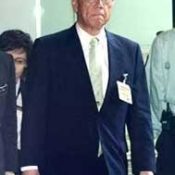
May 24, 2016 Ryukyu Shimpo
On the morning of May 23, Governor Takeshi Onaga of Okinawa went to Tokyo to visit Kantei (the official residence of the Prime Minister) in order to make an appeal related to, and to protest, the recent discovery of Okinawan woman’s corpse that had been abandoned by a military base employee. With his lips pursed and wearing a grim expression, Governor Onaga faced Prime Minister Abe Shinzo and Chief Cabinet Secretary Yoshihide Suga. The politicians did not shake hands in greeting, and even during the one minute when the press usually take pictures and listen to the conference members exchanging greetings, the full minute passed without a word being spoken from either side. Onaga stared straight ahead, not even looking at the other two politicians.
During the conference, Onaga asks, “Do you not think that under the U.S.-Japan Status of Forces Agreement, Japan’s independence is a myth?” On that day, Onaga was composed from start to finish as he answered reporters’ questions, but he was firm in his request for concrete results from the Japanese government in revising the U.S.-Japan SOFA, getting a conference between himself and President Obama, and establishing preventative measures against incidents involving the U.S. military in Okinawa. Despite his weighty emotions, tears only welled up in Onaga’s eyes when the Japanese government showed no sign of setting up means to prevent recurrence of incidents like the one involving the military employee.
At the meeting of the Cabinet Office’s Okinawa Development and Promotion Council that opened after Onaga’s request, the members held a moment of silence for the recent incident. One member shared thought about the direction of Okinawa development and promotion from this point, that “Women are unmistakably vulnerable to sex crime,” and asked, “Is it not important for the government and people to deal with this issue as one?” The impact and shock of the incident is spreading, and leaving an impression on many levels.
After the Council meeting, Onaga mentioned the special treatment military employees get under the U.S.-Japan SOFA. He said that military personnel and employees often look at Okinawan citizens as though Okinawa is still under U.S. occupation. With these statements, Onaga is trying to get the Japanese and the US governments to revise the SOFA.
(English translation by T&CT and Erin Jones)
Go to Japanese
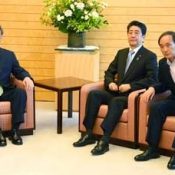
May 24, 2016Ryukyu Shimpo
Regarding the recent arrest of a U.S. military employee on suspicion of disposing of a woman’s body, Okinawa Governor Takeshi Onaga met with Japanese Prime Minister Shinzo Abe on May 23 at the Prime Minister’s Official Residence in Tokyo. Onaga protested the incident, saying, “The crime occurred due to the presence of U.S. bases in Okinawa. I cannot suppress my deep anger and sadness.” He strongly petitioned the national government to revise the U.S.-Japan Status of Forces Agreement in order to prevent future crimes and accidents involving U.S. military personnel and affiliated persons. Onaga simultaneously requested that Abe facilitate a meeting between Onaga and U.S. President Obama, who will be visiting Japan starting May 26. “In order to protect the lives and property of the people in Okinawa, and to protect the safety and security of our children and grandchildren, I hope to be allowed the opportunity to speak directly to President Obama,” Onaga told Abe.
After the meeting, Onaga described his discussion with Abe to the press. The meeting lasted around fourteen minutes, and neither party spoke during the opening segment that was open to the press. From the national government side, Chief Cabinet Secretary Yoshihide Suga also joined the meeting.
During the meeting, Governor Onaga criticized both the U.S. and Japanese governments for their inability to implement effective measures to prevent recurring incidents, saying, “It is unforgivable. I have heard promises to enforce discipline and thoroughly prevent recurrences hundreds of times over the past several decades, but nothing has changed in the slightest.” He expressed outrage regarding the Status of Forces Agreement, which allows special privileges to U.S. military personnel and affiliated persons, saying, “It seems people say that Japan’s independence from the United States is a myth.” He argued the necessity of revising the Status of Forces Agreement in order to effectively prevent the recurrence of crimes.
Prime Minister Abe explained how the government has been addressing the situation, describing its measures to prevent recurrences and the protest it made to U.S. Ambassador to Japan Caroline Kennedy. “I am extremely outraged by this selfish and utterly despicable crime. I intend to call on President Obama to deal firmly with the matter,” said Abe. He expressed his intent to bring up the incident at his meeting with Obama at the Ise Shima G7 summit, but did not mention Onaga’s request to meet with Obama himself.
Speaking to the press after the meeting, Suga expressed a negative view toward the realization of the meeting with President Obama requested by Onaga, saying, “It is only natural that the central government be in charge of negotiating national security and diplomatic issues.”
When asked what he thought about the national government’s negative view toward his request for a meeting with Obama, Onaga said, “[The anger of the Okinawan people] has reached such a point of explosion that [we] cannot keep it bottled in any longer.” He referenced the example of the U.S. military’s failure to adhere to operational regulations agreed upon by the U.S. and Japanese governments, such as regulatory measures to mitigate noise pollution from aircraft, and argued for the need for Okinawa prefectural government representatives to negotiate directly with the United States government.
(English translation by T&CT and Sandi Aritza)
Go to Japanese
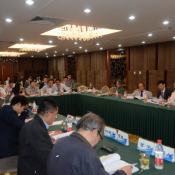
May 16, 2016 Tsuyoshi Arakaki in Beijing
On May 15 at Beijing University in China, the Second Ryukyu Okinawa Frontier Issue International Academic Conference was held for historians from Okinawa and China. The conference examined the history and current issues of Ryukyu/Okinawa. On the first day, attendees presented research on the history of Ryukyu Kingdom such as the annexation of the Ryukyus (“Ryukyu Disposal”) by Japan and trades and tributes with China. It is the second conference of its kind, with the first one being held in 2014.
From Okinawa, three people including Professor Tsuneo Namihira of the University of the Ryukyus participated. From China, 12 people presented research, and there was a presentation by a researcher from Taiwan.
With the title of “Two annexations in Modern East Asian History,” Namihira pointed out commonalities between the annexations of Ryukyu and Korea. He said, “During the reversion to Japan movement, a discourse of shared ancestry between Japanese and Ryukyuan people was diffused as part of political pressure to claim Okinawans as Japanese. This discourse has remained alive without enough reflection.” He pointed out the need to review the history of Ryukyu and Okinawa.
Professor Song Chengyou of Beijing University presented with the title of “Re-recognition of ʻthe Ryukyu Disposal” and said, “ʻDisposalʻ implies an urgency, justifying the invasion, legalizing the illegal, and legitimizing the illegitimate.” He explained that “China was weakened and had no power” when the annexation of Ryukyu became an international issue and China received requests to save the kingdom from the Ryukyuan elites.
Additionally, Shuko Maeda, a researcher from the Japan Society for the Promotion of Science presented on “Shuri National Study and Kume Village” and Yosuke Oshiro, a doctorate student at Beijing University, presented on “Save Ryukyu Movement and Ryukyu Policies of Qing Dynasty.”
At the opening ceremony, representatives from both sides committed to continuing and furthering the exchange of research. On May 16, participants discussed the U.S. military base issues and future visions of Okinawa. Participants from Okinawa also included members of a group that has called for the preservation of a Ryukyuan graveyard in Beijing. The group visited the graveyard in the Tongzhou district of Beijing on May 17.
(English translation by T&CT and Megumi Chibana)
Go to Japanese
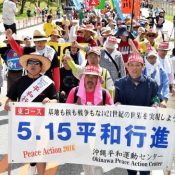
May 13, 2016 Ryukyu Shimpo
To mark the forty-fourth year since Okinawa’s reversion to Japan, the 39th Peace March took three courses, “east,” “west,” and “south”, starting at 9:30 a.m. on May 13. The “east” and ”west” courses took three days to go around the US military bases in the central and southern part of Okinawa Island, while the “south” course covered the battle sites in the area. The three groups met up at the Shintoshin Park in Naha City on the last day of the program, May 15, holding a 5.15 Gathering for Peace and Life at noon.
The participants in the “east” course held an opening ceremony at Camp Schwab of US military where citizens continue to protest against the relocation of U.S. Marine Corps Air Station Futenma to the Henoko district of Nago. Approximately 700 participants from both Okinawa, mainland Japan gathered at the ceremony for the “east” course.
Hiroji Yamashiro, the director of the Okinawa Peace Movement Center, and event organizer said “we won’t allow the strengthening of military base construction. I am confident in the power of our peers from all over the country and want to share my cheers with them. I hope they take up their role in the fight in Okinawa.” The leader of the “east” course, Tetsuji Shimoji, called for solidarity, saying “we will persist with our passion. Let’s stand till the end in solidarity.” After the ceremony, the group started marching to the first checkpoint, the public field in Kin Town.
The “east” group passed through Nago City and took a lunch break nearby Ginoza village office, aiming to reach Kin Town. The participants in the “west” course departed from Yomitan village office and took a break at a community center in Kadena Town, with the final destination being Chatan town office. Lastly, the participants in the “south” course left from Nanjo City Athletics track field, stopping for lunch at Peace Memorial Park in Itoman City, then arriving at the Himeyuri Monument.
(English translation by T&CT and Sayaka Sakuma)
Go to Japanese
May 19, 2016 Ryukyu Shimpo
Juneyao Airlines will launch flights between Naha and Nanjing on July 1. This is the first time the airline will have operated flights between Naha Airport and Nanjing Lukou International Airport. The company will operate two round trips every Monday and Friday. Juneyao Airlines will use an Airbus A320 with 158 seats for the flight. Flights will depart from Nanjing at 8:15 a.m. and return flights will land in Naha at 1:25 p.m.
There are four routes between Okinawa and China through Shanghai, Beijing, Tianjin, and Hangzhou.
(English translation by T&CT)
Go to Japanese





 Webcam(Kokusai Street)
Webcam(Kokusai Street)


